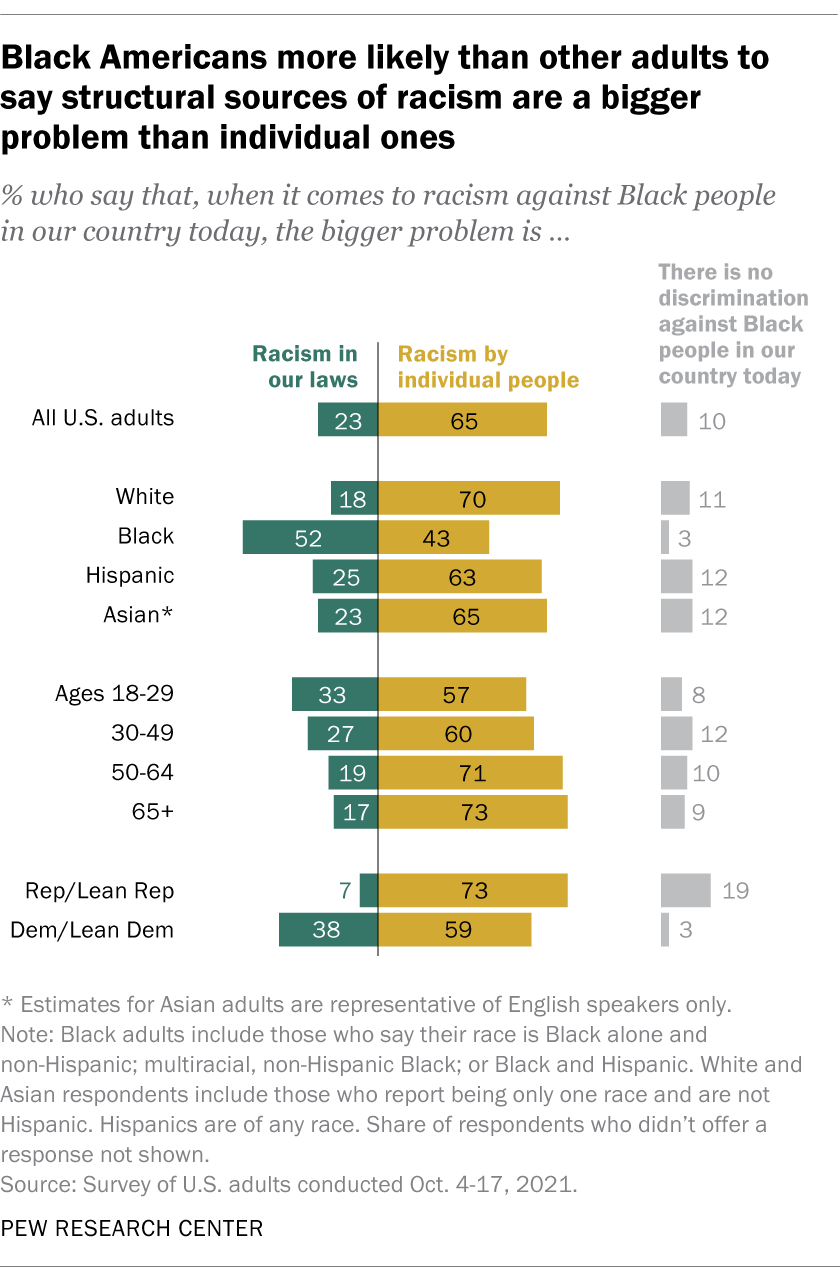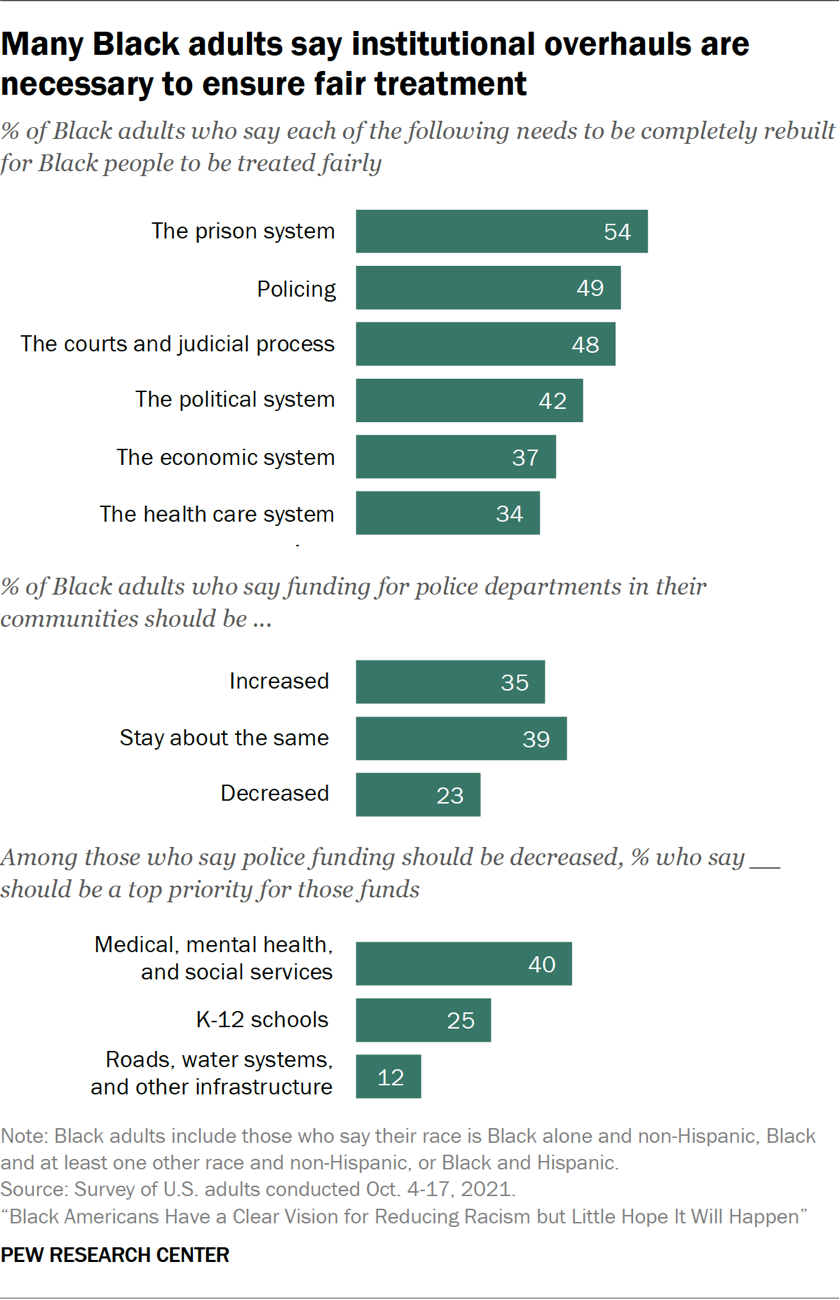Americans tend to view racism by individuals as a bigger problem for Black people in the United States than racism in the nation’s laws. Black Americans themselves, however, are more likely to say racism in U.S. laws is the larger problem, according to a fall 2021 Pew Research Center survey.

Overall, about two-thirds of U.S. adults (65%) say that, when it comes to racism against Black people in our country today, racism by individual people is a bigger problem than racism in our laws. Around a quarter (23%) say that racism in our laws is the bigger problem, while another 10% say that there is no discrimination against Black people in the country today.
Most White (70%), Asian (65%) and Hispanic (63%) adults say that racism by individuals is the larger of the two issues when it comes to racism against Black people. About one-in-ten White (11%), Asian (12%) and Hispanic (12%) adults say is there no discrimination against Black people in the U.S. today.
This Pew Research Center analysis examines Americans’ views on whether individual or structural sources of racism are a bigger problem for Black people in the United States today.
For this analysis, we surveyed 3,912 Black U.S. adults from Oct. 4-17, 2021. Black U.S. adults include those who are single-race, non-Hispanic Black Americans; multiracial, non-Hispanic Black Americans; and adults who indicate they are Black and Hispanic. The survey includes 1,025 Black adults on Pew Research Center’s American Trends Panel (ATP) and 2,887 Black adults on Ipsos’ KnowledgePanel. Respondents on both panels are recruited through national, random sampling of residential addresses. This gives us confidence that any sample can represent the whole population. (See our Methods 101 explainer on random sampling.) We surveyed 6,513 U.S. adults for the general population portion of the survey. White and Asian respondents include those who report being only one race and are not Hispanic. Hispanics are of any race.
Here are the questions used for this survey, along with responses, and its methodology.
Among Black Americans, views on this question are very different. About half of Black adults (52%) say that racism in U.S. laws is the bigger problem for Black people in the country, while 43% say the greater issue is racism by individuals. And just 3% of Black adults say that there is no discrimination against Black people in the U.S. today.
Republicans’ and Democrats’ attitudes on this topic also vary. While majorities in both parties say that racism by individuals is a bigger problem for Black people than structural racism, Republicans and Republican-leaning independents are more likely than Democrats and Democratic leaners to hold this opinion (73% vs. 59%). Democrats, in turn, are much more likely than Republicans to say that racism in U.S. laws is the bigger issue (38% vs. 7%, respectively). And Republicans are much more likely than Democrats to say that there is no discrimination against Black people in the U.S. today (19% vs. 3%).
Majorities across age groups say that racism by individual people is the bigger problem for Black people in America than structural racism. Around six-in-ten adults under 50 (59%) hold this view, as do about seven-in-ten adults 50 and older (72%).
Still, younger adults are more likely than their older counterparts to say that structural racism is a bigger problem than individual racism for Black Americans. A third of adults ages 18 to 29 and 27% of those ages 30 to 49 say this, compared with smaller shares of those ages 50 to 64 (19%) and 65 and older (17%).
The institutional changes Black adults want to see
About six-in-ten Black Americans (63%) say racism is an extremely big problem for Black people living in the U.S., and large shares see institutional change as necessary for Black people to be treated fairly, according to the fall 2021 survey.

About nine-in-ten Black adults say multiple aspects of the criminal justice system need at least minor changes to ensure fair treatment for Black people. Nearly all say either a minor change, major change or complete overhaul is necessary for policing (95%), the courts and judicial process (95%), and the prison system (94%).
In fact, roughly half of Black adults say policing (49%), the courts and judicial process (48%), and the prison system (54%) need to be completely rebuilt for Black people to be treated fairly. Smaller shares say the same about the political (42%), economic (37%) and health care (34%) systems.
Still, most are skeptical change will happen. Two-thirds of Black adults say changes to the prison system (67%) and the courts and judicial process (65%) that would ensure fair treatment for Black people are a little or not at all likely in their lifetime. About six-in-ten (58%) say the same about policing. Only about one-in-ten say changes to policing (13%), the courts and judicial process (12%), and the prison system (11%) are extremely or very likely.
Note: Here are the questions used for this survey, along with responses, and its methodology.

